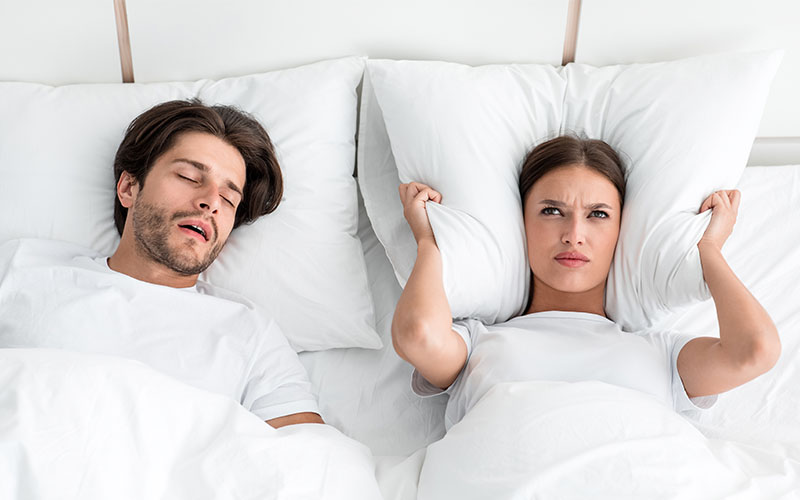If your family or bed partner are complaining of your snoring, you might be wondering about snoring treatment in Edmonton. Although millions of Canadians are diagnosed with sleep apnea every year, we at Lotus Dental Wellness in Edmonton want to assure you that this does not necessarily indicate that you are suffering from sleep apnea.
Diagnosing Sleep Apnea in Edmonton
The primary factor in whether your Edmonton dentist will determine whether you have sleep apnea or not is whether or not you stop breathing between breaths. When snoring is consistent, there may be noise, but the breathing pattern remains the same. With sleep apnea, you may stop breathing due to a blockage of the breathing tube and only draw breath in gasps which often occur through the nose, producing a snoring sound.
If you are unaware of whether you are snoring, and even when you are, keeping a sleep diary can be very helpful in helping both you and your dentist in west Edmonton identify a solution. You will want to make note of waking with a dry or sore throat, difficulty waking or sluggishness, degree of tiredness throughout the day and any other symptoms you might have like headaches, migraines, or muscle tension.
Patients who suffer from sleep disorders often have a coexisting mental health disorder that may include depression, anxiety and irritability. Whether the mental health disorders were present before the sleep disorder may be unclear, but sleep is a key factor in mental health and emotional regulation. Correcting the quality of sleep a patient can obtain often has significant impact on the patient’s positive outlook and ability to tolerate stress.
Other Causes of Snoring
Alcohol
When the muscles of the throat and neck relax, tissues can collapse over the airway, causing a snoring sound as air moves through the flapping tissue. Alcohol is a relaxant that can worsen this effect if consumed before bed.
Allergies
Allergens cause histamine reactions which can cause inflammation of the sinuses and narrowing of the airway. Abstaining from the offending substance (pet pelt, flower pollen etc.) and/or using antihistamine medications can assist in decreasing airway resistance, but may cause drowsiness in some users.
Sinus Cold
Congestion in the nasal passages and the sinuses often cause snoring and a tendency to mouth breathe. This condition typically improves as the congestion improves.
Sleeping Position
Sleeping on our backs puts the forces of gravity in high effect against our airways. Patients who find snoring is a problem while on their backs may find relief from repositioning the tissues by laying on their side or sleeping in a semi-upright position.
Medications
Some prescription medications can be sedating, causing a loss of muscle tone in the throat. If you think your medications could be interfering with the quality of your sleep, talk to your doctor or ask your dentist in westside Edmonton.
Weight
Weight gain is a frequent cause of snoring in patients due to an increase in the volume and weight of the tissues that weigh on the airway when sleeping on their backs. Patients are often counselled to consider losing weight to correct this problem, but a change in sleep position to the side can be helpful in the short term.
Don’t wait until your next dental check-up to investigate your sleep problems with whichever you consider to be the best dental clinic in west Edmonton for your condition and preferences.
Age
As we get older, our bodies become weaker, and our throat muscles are no exception. Your dentist may be able to offer a sleep appliance that will position your jaw further forward in order to hold your airway clear.
Hypothyroidism
Snoring can be a sign of hypothyroidism, a condition which indicates a low-functioning thyroid. Your dentist in west Edmonton may advise you to have your thyroid checked with a blood test.
Ask Your Dentist
If you think that snoring could indicate a potential sleep disorder, your dentist can begin their assessment right away. In order to confirm a diagnosis of sleep apnea, you will be asked to wear a piece of head gear over night which will monitor your sleep quality and disturbances. In some cases, you may be asked to attend a more in-depth sleep study in a clinical setting. If you are diagnosed with sleep apnea, you could benefit from treatments such as an oral sleep appliance or CPAP (Continuous Positive Air Pressure) machine. These treatments may be covered in whole or in part by your insurance provider. Always get a predetermination of coverage from your insurance company before committing to the cost of treatment. If cost is a concern, ask your dentist about any payment plans they may offer to their patients.
